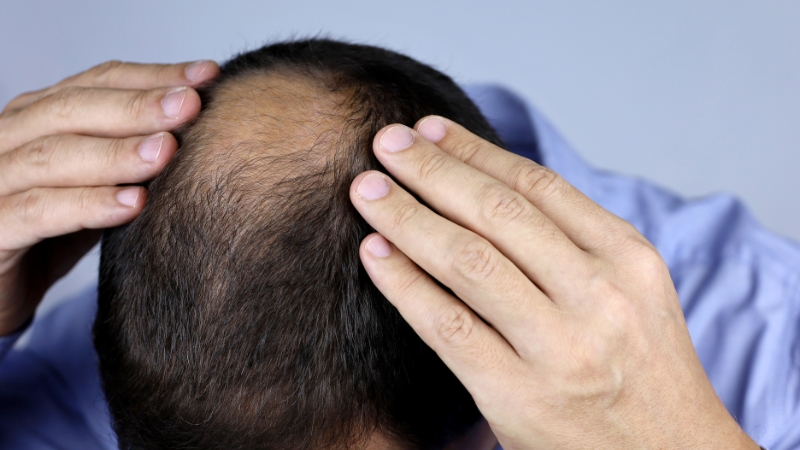
Share Post:
Men often push subtle health signs to the side, brushing them off as minor or irrelevant.
Fatigue, digestive discomfort, or mood changes are commonly written off as stress, age, or “just life.”
In doing so, serious underlying conditions may remain undetected. Prioritizing early recognition can be the difference between manageable treatments and life-altering complications.
Here are seven issues frequently ignored but worth serious attention.
1. Fatigue That Won’t Go Away

Fatigue tends to slide under the radar, often brushed off as the result of long workdays, erratic schedules, or poor sleep habits. Persistent tiredness, though, may reflect far more serious conditions than just a busy routine.
A medical explanation often exists behind energy depletion, especially when fatigue lingers for weeks or worsens over time.
When persistent exhaustion sets in, possible causes include:
- Anemia, which reduces oxygen delivery to muscles and tissues
- Thyroid dysfunction, leading to slowed metabolism and energy loss
- Low testosterone, which affects mood, stamina, and motivation
- Autoimmune conditions that sap strength as part of systemic inflammation
- Early signs of heart disease include reduced oxygenated blood flow
Unchecked fatigue gradually chips away at mental clarity, physical endurance, and emotional stability. Increased irritability, decreased focus, and higher chances of errors or accidents often follow.
What begins as manageable tiredness can evolve into long-term impairment.
Instead of assuming late nights or stress are the only causes, it’s important to rule out deeper problems. Consistent exhaustion warrants action.
Recommended steps include:
- Full blood panel to assess anemia and thyroid levels
- Hormone testing to evaluate testosterone and cortisol
- Evaluation of sleep patterns and potential apnea
- Consultation with a physician for a broader assessment
Acting early doesn’t just revive energy. It often uncovers treatable conditions that otherwise continue to undermine health silently.
2. Frequent Heartburn or Indigestion
Heartburn is often shrugged off as the aftermath of spicy food or a rough day. When indigestion keeps returning, though, the cause could go far past dietary indulgence.
Gastroesophageal reflux disease (GERD) often leads to chronic acid exposure in the esophagus.
Without proper treatment, it can cause inflammation, erosion of the esophageal lining, and increase the chance of more serious complications, including cancer.
Digestive discomfort may also point to heart-related issues. When acid reflux shows up with chest tightness or pain, cardiac evaluation becomes necessary.
Assuming all chest-related symptoms come down to indigestion can delay intervention at a critical moment.
Acid making its way upward regularly causes tissue damage and can result in difficulty swallowing or scar formation.
Certain signals should raise concern and deserve medical attention:
- Burning sensation in the chest more than twice per week
- Bitter or sour taste in the mouth during or after meals
- Difficulty swallowing or sensation of a lump in the throat
- Chronic sore throat or dry cough
Over-the-counter antacids offer only temporary relief and may disguise a recurring issue. Relying solely on them delays proper care.
Tracking symptoms with a journal, modifying eating times, and seeking diagnostic tools like endoscopy can help identify underlying conditions accurately.
3. Hair Loss

Hair thinning or loss often gets brushed aside as a normal part of aging or family traits. Genetics matter, but sudden or patchy hair loss can point to deeper physiological disruptions.
Hormonal shifts, thyroid problems, and nutritional deficiencies, such as low iron, biotin, or zinc are common contributors that disrupt hair growth cycles.
Hair loss affects more than just appearance. The psychological toll can be substantial, leading to reduced confidence, anxiety, or social withdrawal.
Men frequently ignore the early signs out of embarrassment or the belief that nothing can be done. Addressing the issue early, however, opens access to targeted care that can deliver visible improvement.
Effective management begins with recognizing associated symptoms and patterns. When evaluating causes and options, consider:
- Hormonal imbalances: Low testosterone, thyroid dysfunction
- Nutritional issues: Deficiencies in iron, vitamin D, zinc, or biotin
- Autoimmune concerns: Conditions like alopecia areata
- Lifestyle factors: Stress, poor sleep, or crash dieting
Treatment strategies for hair loss vary, and early detection increases effectiveness. Available solutions include:
- Topical treatments: Minoxidil-based products
- Oral medications: Finasteride or supplements
- Procedures: PRP (platelet-rich plasma), microneedling, laser therapy
- Hair transplants: Surgical options tailored to specific hair loss types
Hair loss treatments in Australia have advanced significantly, offering men a wide array of choices tailored to individual causes and patterns.
Dermatologists and trichologists often begin with hormone and blood panel assessments to identify the root issue.
4. Erectile Dysfunction
Men often ignore erectile dysfunction (ED) due to shame, fear of judgment, or misplaced confidence. It gets labeled as a temporary mental block or stress-related issue, but it can serve as a warning signal for deeper systemic problems.
Poor circulation, nerve impairment, or hormone imbalances are often involved.
ED also acts as an early sign of cardiovascular problems. Narrowed penile arteries may reflect wider arterial blockages that could affect heart health. Connections to conditions like diabetes, hypertension, and metabolic dysfunction are frequently found in those experiencing ED.
Consequences go beyond the physical. Sexual function influences mental well-being and relationship stability.
When left unaddressed, tension builds, communication fades, and emotional distance grows. Early medical input not only addresses performance issues but may prevent more serious disease.
Key concerns and signs to pay attention to:
- Inability to achieve or maintain an erection
- Reduced sexual desire
- Delayed or absent ejaculation
- Emotional distress and withdrawal from intimacy
Taking action means more than a prescription. Cardiovascular screening, hormonal testing, and healthy lifestyle habits should follow. Seeking support shows self-awareness, not weakness.
5. Changes in Urination
@renamalikmdIs your pee spraying instead of streaming? Let’s talk about it. If you’ve noticed your urinary stream isn’t as straight as it used to be, you’re not alone — and there’s usually a medical reason behind it. ⚠️ While these causes are common and often benign, they’re not something to ignore if symptoms persist. 📲 Watch the full reel to learn more and share it with someone who might need to hear this. #menshealth #bph #urinaryhealth #prostatehealth #renamalikmd
Minor urination changes often slip through the cracks. Men might consider it part of aging or something too trivial to mention.
Problems like difficulty starting, interrupted flow, or frequent nighttime urges could point to prostate enlargement or urinary tract issues.
Complications intensify when symptoms are ignored. Kidney stress, infections, and bladder dysfunction may occur. In serious cases, prostate cancer or advanced kidney disease can go unnoticed until major damage sets in.
Early warning signs to track:
- Trouble initiating or stopping urination
- Increased urgency, especially at night
- Pain or burning sensations
- Blood in urine or unexpected incontinence
Ignoring these indicators risks long-term damage. Basic medical testing like PSA levels, physical examination, and imaging, offer a quick path to answers.
Timely care can prevent major procedures and restore quality of life.
6. Unexplained Weight Fluctuations

Sudden weight gain or loss without dietary or activity changes often signals more than lifestyle inconsistency.
Hormonal disorders, metabolic dysfunction, and gastrointestinal problems may disrupt the body’s normal weight regulation. Diabetes, liver problems, and thyroid conditions are common culprits.
Weight shifts often go unnoticed until clothes no longer fit or energy levels drop. Relying on stress or age to explain changes allows the root issue to grow unchecked. Monitoring weight with regular weigh-ins helps spot trends that might otherwise slip by.
Indicators that deserve further investigation:
- Gaining or losing more than 5% of body weight in a month
- No change in eating habits or activity levels
- Fatigue or reduced stamina
- Digestive discomfort or bloating
A proactive approach includes regular blood tests, hormone evaluation, and specialist consultation. In some cases, hair loss can accompany rapid weight changes due to nutritional or hormonal shifts.
7. Mood Swings or Depression

Emotional turbulence is often downplayed. Men may attribute sadness, irritability, or anxiety to pressure at work or general dissatisfaction. Suppression often stems from stigma, fear of appearing weak, or a habit of emotional stoicism.
Changes in mood frequently relate to medical conditions, not just life stress. Hormonal imbalances, such as low testosterone, or early-stage neurological disorders like dementia, may cause behavioral shifts before physical symptoms appear.
Depression also increases the risk of chronic illness and even early mortality when ignored.
Symptoms that should never be dismissed:
- Ongoing sadness or emptiness
- Sudden anger, irritability, or frustration
- Withdrawal from social activities or loved ones
- Sleep problems or loss of interest in hobbies
Professional intervention provides clarity. Mental health support, along with physical health screenings, ensures nothing critical goes undetected.
Tackling mood swings head-on protects not only personal well-being but the strength of close relationships.
Summary
Small signals often speak volumes. Fatigue, digestive issues, sexual health changes, or emotional shifts deserve attention, not dismissal.
Waiting for symptoms to become unbearable only complicates recovery.
Early detection leads to stronger outcomes and better living. Speak up. Get checked. Stay ahead.
Related Posts:
- How to Get Hair Out of a Necklace Chain Quickly and Easily
- What Women Over 40 Get Wrong About Summer Clothing
- The Silent Struggles of Women in Nursing Homes
- Types And Causes Of Breast Discharge - What Your…
- How Hormonal Imbalances Affect Body Fat Distribution…
- Fluid Retention vs. Edema: The Differences and Why…








